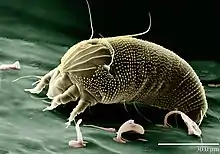mite
English
Etymology
From Middle English mite, from Old English mīte (“mite, tiny insect”), from Proto-West Germanic *mītā, from Proto-Germanic *mītǭ (“biting insect”, literally “cutter”), from *maitaną (“to cut”), from Proto-Indo-European *mey- (“small”) or *meh₂y- (“to cut”). Akin to Old High German mīza (“mite”), Middle Dutch mīte (“moth, mite”), Dutch mijt (“moth, mite”), Danish mide (“mite”).
Pronunciation
- (Received Pronunciation, General American) enPR: mīt, IPA(key): /maɪt/
Audio (GA) (file) - Rhymes: -aɪt
- Homophone: might
Noun
mite (plural mites)
- Any of many minute arachnids which, along with the ticks, comprise subclass Acarina (aka Acari).
- A small coin formerly circulated in England, rated at about a third of a farthing.
- 1803, William Blake, Auguries of Innocence:
- One mite wrung from the lab'rer's hands
Shall buy and sell the miser's lands;
- A lepton, a small coin used in Palestine in the time of Christ.
- A small weight; one twentieth of a grain.
- (sometimes used adverbially) Anything very small; a minute object; a very little quantity or particle.
- 1903 March 17, Mark Twain, letter to Helen Keller:
- It takes a thousand men to invent a telegraph, or a steam engine, or a phonograph, or a photograph, or a telephone or any other important thing — and the last man gets the credit and we forget the others. He added his little mite — that is all he did.
- 1913, Joseph C[rosby] Lincoln, chapter V, in Mr. Pratt’s Patients, New York, N.Y., London: D[aniel] Appleton and Company, →OCLC:
- "Well," I says, "I cal'late a body could get used to Tophet if he stayed there long enough." She flared up; the least mite of a slam at Doctor Wool was enough to set her going.
- 1956, Janice Holt Giles, chapter 8, in Hannah Fowler, Boston, Mass.: Houghton Mifflin, →OCLC; republished Lexington, Ky.: University Press of Kentucky, 1992, →ISBN, page 69:
- "Silas, now," Esther Whitley had said, "would be a good one for you, Hannah. He's a mite on the old side, but he's steady, an' he's been wed before. He knows the ways of a woman better'n some."
- 1959, Frances Cavanah, Abe Lincoln Gets His Chance, Chicago, Ill.: Rand McNally, →OCLC; Abe Lincoln Gets His Chance (ReadHowYouWant Classics Library), EasyRead large edition, U.S.A.: ReadHowYouWant, 2008, →ISBN, page 30:
- Those trousers are a mite too big, but you'll soon grow into them.
- (colloquial, often used affectionately) A small or naughty person, or one people take pity on; rascal.
- 2014, Lorraine F Elli, The Little Town Mouse:
- “Tom told me that, but twasn't your fault, the little mite just couldn't wait to be born that's all.” A small smile played on Leah's lips.
Synonyms
- (small amount): see also Thesaurus:modicum.
Derived terms
- air-sac mite (Cytleichus nudus)
- a mite
- bee mite (Varroa destructor)
- beetle mite (Oribatoidea spp.)
- bird mite (Ornithonyssus spp.)
- blackberry mite (Aceria essigi)
- book mite
- broad mite
- carpet mite (Psoroptidae spp.)
- cat fur mite (Cheyletiella blakei)
- cheese mite (Tyrolichus casei)
- chicken mite
- clover mite (Bryobia praetiosa)
- common house mite (Glycyphagus domesticus)
- dog fur mite (Cheyletiella yasguri)
- dust mite (Reduvius personatus, Dermatophagoides spp.)
- ear mite (Otodectes cynotis)
- eyelash mite
- feather mite
- flour mite (Acarus siro)
- follicle mite
- fruit mite (Carpoglyphus lactis et al.)
- furniture mite (Glycyphagus domesticus)
- gall mite
- harvest mite (Trombicula spp.)
- house dust mite (Dermatophagoides pteronyssinus)
- house mouse mite (Liponyssoides sanguineus)
- itch mite (Sarcoptes scabiei)
- mite box
- mite cheese
- moss mite
- peacock mite
- prune mite (Carpoglyphus lactis)
- quill mite
- rabbit ear mite
- rabbit fur mite (Cheyletiella parasitovorax)
- red mite (Dermanyssus gallinae)
- red velvet mite
- rust mite
- spider mite (Tetranychidae spp.)
- spiny rat mite (Laelaps echidnina)
- stock mites (Lepidoglyphus, Acarus, Tyrophagus, Tydeus, Cheyletus, Tarsonemus spp.)
- storage mite (Acarus siro)
- sugar mite (Lepidoglyphus destructor)
- trombiculid mite (Trombiculidae spp.)
- tropical rat mite (Ornithonyssus bacoti)
- water mite
- wheat mite (Acarus siro)
- widow's mite
- Willamette mite, Willamette spider mite (Tetranycus willamette)
- wing mite (Pterolichus obtusus)
- wood mite (Oribatidae spp.)
Translations
|
Au
References
- transnewguinea.org, citing D. C. Laycock, Languages of the Lumi Subdistrict (West Sepik District), New Guinea (1968), Oceanic Linguistics, 7 (1): 36-66
Catalan
Further reading
- “mite” in Diccionari de la llengua catalana, segona edició, Institut d’Estudis Catalans.
French
Etymology
Inherited from Middle French, from Old French mitte (“kind of insect which gnaws on cloth or cheese”), from Middle Dutch mīte (“moth, mite”), ultimately from Proto-Germanic *mītǭ (“biting insect”, literally “cutter”), from *maitaną (“to cut”).
Akin to Old English mīte (“mite, tiny insect”), Old High German mīza (“mite”), Danish mide (“mite”).
Pronunciation
- IPA(key): /mit/
audio (file)
Noun
mite f (plural mites)
Derived terms
- antimite
- boule à mites
Verb
mite
- inflection of miter:
- first/third-person singular present indicative/subjunctive
- second-person singular imperative
Further reading
- “mite”, in Trésor de la langue française informatisé [Digitized Treasury of the French Language], 2012.
Italian
Pronunciation
- IPA(key): /ˈmi.te/
- Rhymes: -ite
- Hyphenation: mì‧te
Audio (file)
Adjective
mite (plural miti)
Derived terms
Further reading
- mite in Treccani.it – Vocabolario Treccani on line, Istituto dell'Enciclopedia Italiana
Latin
Pronunciation
- (Classical) IPA(key): /ˈmiː.te/, [ˈmiːt̪ɛ]
- (modern Italianate Ecclesiastical) IPA(key): /ˈmi.te/, [ˈmiːt̪e]
References
- “mite”, in Charlton T. Lewis and Charles Short (1879) A Latin Dictionary, Oxford: Clarendon Press
- “mite”, in Charlton T. Lewis (1891) An Elementary Latin Dictionary, New York: Harper & Brothers
Norman
Etymology
From Old French mitte (“kind of insect which gnaws on cloth or cheese”), from Middle Dutch mīte (“moth, mite”), ultimately from Proto-Germanic *mītǭ (“biting insect”, literally “cutter”).
Portuguese
Verb
mite
- inflection of mitar:
- first/third-person singular present subjunctive
- third-person singular imperative
